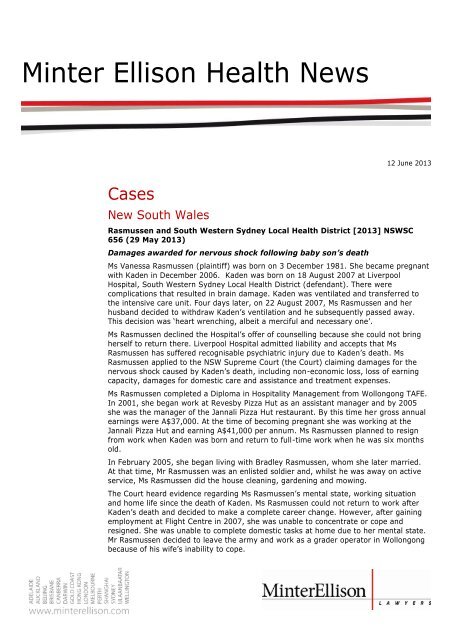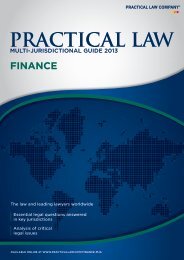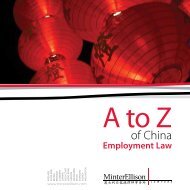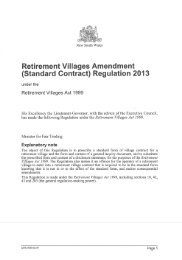Minter Ellison Health News 12 June 2013
Minter Ellison Health News 12 June 2013
Minter Ellison Health News 12 June 2013
You also want an ePaper? Increase the reach of your titles
YUMPU automatically turns print PDFs into web optimized ePapers that Google loves.
<strong>Minter</strong> <strong>Ellison</strong> <strong>Health</strong> <strong>News</strong><br />
<strong>12</strong> <strong>June</strong> <strong>2013</strong><br />
Cases<br />
New South Wales<br />
Rasmussen and South Western Sydney Local <strong>Health</strong> District [<strong>2013</strong>] NSWSC<br />
656 (29 May <strong>2013</strong>)<br />
Damages awarded for nervous shock following baby son’s death<br />
Ms Vanessa Rasmussen (plaintiff) was born on 3 December 1981. She became pregnant<br />
with Kaden in December 2006. Kaden was born on 18 August 2007 at Liverpool<br />
Hospital, South Western Sydney Local <strong>Health</strong> District (defendant). There were<br />
complications that resulted in brain damage. Kaden was ventilated and transferred to<br />
the intensive care unit. Four days later, on 22 August 2007, Ms Rasmussen and her<br />
husband decided to withdraw Kaden’s ventilation and he subsequently passed away.<br />
This decision was ‘heart wrenching, albeit a merciful and necessary one’.<br />
Ms Rasmussen declined the Hospital’s offer of counselling because she could not bring<br />
herself to return there. Liverpool Hospital admitted liability and accepts that Ms<br />
Rasmussen has suffered recognisable psychiatric injury due to Kaden’s death. Ms<br />
Rasmussen applied to the NSW Supreme Court (the Court) claiming damages for the<br />
nervous shock caused by Kaden’s death, including non-economic loss, loss of earning<br />
capacity, damages for domestic care and assistance and treatment expenses.<br />
Ms Rasmussen completed a Diploma in Hospitality Management from Wollongong TAFE.<br />
In 2001, she began work at Revesby Pizza Hut as an assistant manager and by 2005<br />
she was the manager of the Jannali Pizza Hut restaurant. By this time her gross annual<br />
earnings were A$37,000. At the time of becoming pregnant she was working at the<br />
Jannali Pizza Hut and earning A$41,000 per annum. Ms Rasmussen planned to resign<br />
from work when Kaden was born and return to full-time work when he was six months<br />
old.<br />
In February 2005, she began living with Bradley Rasmussen, whom she later married.<br />
At that time, Mr Rasmussen was an enlisted soldier and, whilst he was away on active<br />
service, Ms Rasmussen did the house cleaning, gardening and mowing.<br />
The Court heard evidence regarding Ms Rasmussen’s mental state, working situation<br />
and home life since the death of Kaden. Ms Rasmussen could not return to work after<br />
Kaden’s death and decided to make a complete career change. However, after gaining<br />
employment at Flight Centre in 2007, she was unable to concentrate or cope and<br />
resigned. She was unable to complete domestic tasks at home due to her mental state.<br />
Mr Rasmussen decided to leave the army and work as a grader operator in Wollongong<br />
because of his wife’s inability to cope.
2 MINTER ELLISON LAWYERS HEALTH NEWS <strong>12</strong> <strong>June</strong> <strong>2013</strong><br />
Ms Rasmussen was successful in gaining employment at an ANZ Bank Branch in 2010.<br />
However, her work performance is compromised by her anxiety and stresses.<br />
Ms Rasmussen has since had two daughters born in 2010 and 20<strong>12</strong>. She suffered from<br />
post-natal depression after the birth of her second daughter. This was contributed, in<br />
part, by the trauma she suffered after Kaden’s death. She has completed a Bachelor of<br />
Arts Degree at Southern Cross University by correspondence.<br />
Expert psychiatric evidence concluded that Ms Rasmussen has suffered an anxiety<br />
disorder and a pathological grief reaction, which is a ‘recognisable psychiatric illness’<br />
under section 31 of the Civil Liability Act 2002 (NSW). Her symptoms will improve with<br />
treatment and the passage of time.<br />
In assessing damages, the Court accepted that Kaden’s death had transformed Ms<br />
Rasmussen’s life significantly. The births and nurturing of her two daughters had been<br />
affected by the loss of Kaden. Ms Rasmussen is overly concerned and anxious for their<br />
welfare. ‘The grief she suffers is lifelong.’ 1<br />
Ms Rasmussen’s work enthusiasm has been hindered by constant fears of job loss,<br />
concerns about whether she is performing in her job to a satisfactory standard and<br />
anxiety for the care of her children whilst she is at work. Ms Rasmussen is prone to<br />
anxiety and emotional liability when she encounters boys who would have been Kaden’s<br />
contemporaries.<br />
The Court noted Ms Rasmussen's abilities to obtain a degree, look after her children and<br />
work part-time, all demonstrating her capabilities to concentrate and perform. It<br />
showed a motivation to return to normal functioning.<br />
The Court awarded judgment for the plaintiff in the amount of A$366,903.60.<br />
Click here for the full decision<br />
Victoria<br />
Inquest into the death of Corey Irving Wright (22 May <strong>2013</strong>)<br />
Coroner finds the lack of a formal mental health status review over one month<br />
was not causally related to the suicide of an involuntary psychiatric patient<br />
Mr Wright was 41 years of age and was the oldest of five children. He grew up in<br />
children’s homes and in foster care after his father left when he was young. Mr Wright’s<br />
mother, who suffered from schizophrenia, took her own life in 1998. Mr Wright kept in<br />
contact with his sister, Freyja De Losa, and was living with his brother, Jason Wright,<br />
and housemate, Martin Powell, at the time of his death.<br />
Mr Wright had a history of paranoid schizophrenia, polysubstance abuse (marijuana,<br />
amphetamine and heroin) and self harm. He had a number of admissions to Mental<br />
<strong>Health</strong> Services, including an admission to Thomas Embling Hospital due to an incident<br />
involving the destruction of property and theft in 2005. Since this time he had been<br />
treated as an involuntary psychiatric patient, subject to a community treatment order<br />
(CTO) under the supervision of Moreland Continuing Care Team (CCT), a unit of the<br />
North West Area Mental <strong>Health</strong> Service. He was receiving fortnightly depot injections of<br />
risperdal consta since 2005.<br />
Mr Wright did not believe he was suffering from a mental illness and would often discuss<br />
ceasing his medications due to the number of side effects he was experiencing,<br />
including drowsiness, upset stomach, skin rashes and sweating. On 16 August 2006, Dr<br />
Ana Lusicic (psychiatry registrar) and Ms Danielle Ashley (case manager) conducted a<br />
psychiatric review of Mr Wright. Dr Lusicic and Ms Ashley reported him to be engrossed<br />
1 At [52], Adamson J
3 MINTER ELLISON LAWYERS HEALTH NEWS <strong>12</strong> <strong>June</strong> <strong>2013</strong><br />
with his medication and not wanting to be on a CTO. He lacked insight into his illness<br />
but denied any plans to harm himself or others.<br />
Mr Wright did not attend his next scheduled appointment on 22 August 2006. Medical<br />
records show that Dr Lusicic called Jason Wright to enquire of his brother’s whereabouts.<br />
Jason advised that Mr Wright did not feel well. When Dr Lusicic did speak with Mr Wright<br />
he agreed to attend on 23 August 2006. However, he failed to attend this appointment<br />
also. Dr Lusicic again telephoned Mr Wright and was informed that he was unwell due<br />
to the medication. Jason also advised Dr Lusicic that Mr Wright wanted to change<br />
doctors to one closer to his residential address in Frankston North. Dr Lusicic informed<br />
Mr Wright that due to his CTO a request for change needed to be in writing from his<br />
treating doctor.<br />
Mr Powell attended a Mental <strong>Health</strong> Review Board hearing with Mr Wright on 25 August<br />
2006 to confirm his involuntary status. He failed to attend a scheduled psychiatric<br />
review on 1 September 2006, this was rescheduled for 21 September 2006. However,<br />
he did attend a clinic appointment to receive his depot medications on 29 August and 13<br />
September 2006.<br />
Jason and Mr Powell reported seeing Mr Wright on the morning of 15 September 2006<br />
and did not notice any unusual behaviour. Between 11:00am and <strong>12</strong>:00pm, Mr Wright<br />
left the house with Jason’s bike. At <strong>12</strong>:34pm, a short distance from Kananook Railway<br />
Station, Mr Wright was seen to stand in the middle of the train track in the path of an<br />
oncoming train. Mr Wright was hit by the train and suffered fatal injuries. Jason’s bike<br />
was found a short distance away with Mr Powell’s phone numbers on a hand written<br />
note that was found in the gear cogs of the bike’s back wheel.<br />
At inquest, the Coroner accepted evidence from Mr Wright’s Total Care Progress Notes<br />
that showed he regularly missed scheduled appointments and, as a result, full mental<br />
status assessments were not performed at regular periods. A period of approximately<br />
one month had elapsed since his review with Dr Lusicic and Ms Ashley on 16 August<br />
2006 until his death on 15 September 2006.<br />
The Coroner heard evidence form Dr Jagadheesen, supervising consultant psychiatrist,<br />
at Moreland CCT. Dr Jagadheesen would only see clients under the care of the Mental<br />
<strong>Health</strong> team if he was referred to do so by the clinicians or if the progress notes<br />
indicated it was necessary. Dr Jagadheesen did not consider Mr Wright’s failure to<br />
attend clinic appointments as overly concerning. He was satisfied that Mr Wright had<br />
attended for his depot injections and was confident that Registered Psychiatric Nurses<br />
(RPN) would notify Mr Wright’s case managers or Dr Lusicic if they had any concerns.<br />
Furthermore, Dr Jagadheesen did not feel it necessary to revoke Mr Wright’s CTO and<br />
have him admitted to a psychiatric ward because of his failure to attend scheduled<br />
appoints. Dr Jagadheesen considered this ‘unnecessarily restrictive’. Dr Jagadheesen<br />
was unaware that Mr Wright had wanted to be transferred to a Mental <strong>Health</strong> Service<br />
closer to Frankston. He confirmed that this was generally an easy process that could be<br />
initiated by a request from a medical practitioner or the North West Area Mental <strong>Health</strong><br />
Service.<br />
The Coroner found the Total Care Progress Notes to be legible and sufficiently<br />
informative to reflect the endeavours of Moreland CCT to engage with, treat and<br />
supervise Mr Wright. However, the Coroner accepted that Mr Wright never fully engaged<br />
or developed a rapport with his mental health treatment team. The Coroner was not<br />
critical of the treating mental health team for this lack of rapport but attributed it to Mr<br />
Wright’s lack of insight into his own mental health and his requirement for ongoing<br />
treatment.<br />
There was no evidence to suggest Mr Wright had experienced an increase in his suicidal<br />
ideations. Furthermore, other evidence, including the lack of any discussion concerning
4 MINTER ELLISON LAWYERS HEALTH NEWS <strong>12</strong> <strong>June</strong> <strong>2013</strong><br />
the outcome of the Mental <strong>Health</strong> Review Board, the location of his mental health<br />
providers or the lack of a formal mental status review over one month was not found to<br />
be causally related to Mr Wright’s decision to take his own life.<br />
The Coroner concluded that Mr Wright’s mental health care was reasonable and<br />
appropriate in the circumstances.<br />
Click here for the findings<br />
Western Australia<br />
LS and Mental <strong>Health</strong> Review Board [<strong>2013</strong>] WASCA <strong>12</strong>8 (24 May <strong>2013</strong>)<br />
Court's judgement that the Mental <strong>Health</strong> Review Board does not have the<br />
power to carry out a review of an involuntary patient order after the person<br />
has ceased to be an involuntary patient<br />
LS (appellant) had a long standing history of mental illness. On 11 May 2011, Dr L made<br />
a Community Treatment Order (CTO) for LS and on 13 May 2011, revoked the CTO and<br />
ordered that LS be detained in an authorised hospital as an involuntary patient under<br />
section 70(1) of the Mental <strong>Health</strong> Act 1996 (WA) (MH Act).<br />
On 10 <strong>June</strong> 2011, Dr L ordered LS to continue to be detained under an involuntary<br />
treatment order. On <strong>12</strong> July 2011, the Mental <strong>Health</strong> Review Board (the Board) decided,<br />
under section 138 of the MH Act, to continue the involuntary order made by Dr L and on<br />
22 July 2011, LS commenced proceedings in the State Administrative Tribunal (the<br />
Tribunal) for review of the Board’s decision.<br />
On 2 September 2011, the Board conducted a hearing to review the CTO of the 15<br />
August 2011. The Board concluded that LS was no longer an involuntary patient within<br />
the terms of the MH Act. On the 6 September 2011, the Tribunal dismissed LS’s<br />
application made on 22 July 2011 for review of the Board’s decision because the<br />
Tribunal no longer had jurisdiction to review a decision of the Board where LS was no<br />
longer an involuntary patient. 2<br />
LS made an appeal in the WA Supreme Court of Appeal (the Court) against the<br />
Tribunal’s order. LS relied on three grounds for appeal, these were:<br />
1. The Tribunal erred in concluding that a review of an order of the Board under<br />
section 148A of the MH Act ‘falls away’ when the subject of the review ceases to be<br />
an involuntary patient.<br />
2. The Tribunal made an error when it concluded that the powers of the Board when it<br />
carries out reviews and periodic reviews of involuntary patient orders under<br />
sections 138, 139 and 142 of the MH Act ‘falls away’ when the subject ceases to be<br />
an involuntary patient; and<br />
3. The Tribunal erred when it treated the conditions under sections 138(3) and 139(2)<br />
of the MH Act as being functions and discretions of the Board to be exercised by the<br />
Tribunal under sections 29 (Tribunal’s powers in Review Jurisdiction) of The State<br />
Administrative Tribunal Act 2004 (WA) (the SAT Act).<br />
The Court considered relevant sections of the MH Act, including the provisions for<br />
involuntary patient orders, the powers of the Board, applications to the Tribunal and the<br />
jurisdiction and powers of the Tribunal under The State Administrative Tribunal Act 2004<br />
(WA) (SAT Act).<br />
The Court observed the Tribunal’s review jurisdiction with regard to pervious case<br />
authorities. In particular, the Court noted that the Tribunal is required to give attention<br />
2 See LS and Mental <strong>Health</strong> Review Board [20<strong>12</strong>] WASAT 76 (20 April 20<strong>12</strong>)
5 MINTER ELLISON LAWYERS HEALTH NEWS <strong>12</strong> <strong>June</strong> <strong>2013</strong><br />
to the situation existing at the time of the decision under review. 3 Furthermore, the<br />
powers of the Tribunal may be broader than the original decision maker but the task of<br />
the Tribunal is to reconsider what the original decision maker did. The Court found<br />
nothing in the SAT Act that enabled the Tribunal to deal with a matter that is ‘different<br />
in essence’ from what was before the original decision-maker. 4<br />
The Court dismissed the first ground for appeal because the Tribunal was unable to<br />
undertake its statutory power as LS had ceased to be an involuntary patient at that time.<br />
The Tribunal did not lack jurisdiction, but used its powers under section 47(1)(a) of the<br />
SAT Act to dismiss the proceeding.<br />
The Court considered the second ground of LS’s appeal and held that the Board's power<br />
to review under section 138 (and sections 139 and 142) is dependent upon the person<br />
concerned being an involuntary patient at that time. The provision is forward-looking in<br />
that it requires the Board to consider if the involuntary order at the time ‘should<br />
continue to have effect’. It is not required to consider whether a past decision is correct<br />
or not.<br />
In making the decision, the Board is to have regard to the person’s psychiatric and<br />
medical history at that point in time. The Board is to then determine the decision for the<br />
future, taking into account the best care and treatment that least interferes with the<br />
person’s rights and dignity. 5 In addition, the Court concluded that section 144 MH Act<br />
where the Board may review an involuntary case at any time, does not confer any<br />
power on the Board to consider the validity of previous involuntary patient orders.<br />
In relation to the third ground of appeal, the Court held that reviews under sections 138<br />
and 139 of the MH Act and section 29(1) of the SAT Act are ‘functions’ of the Board as<br />
defined in section 5 of the Interpretation Act 1984 (WA). ‘Function’ is defined in the<br />
Interpretation Act 1984 as ‘powers, duties, responsibilities, authorities and jurisdictions.’<br />
The Court dismissed the appeal.<br />
Click here for the full decision<br />
New Zealand<br />
Grobler and Accident Compensation Corporation [<strong>2013</strong>] NZACC 115 (24 April<br />
<strong>2013</strong>)<br />
A recent judgment of the District Court considered whether delays during labour caused<br />
a baby to suffer a ‘treatment injury’ for the purposes of the Injury Prevention,<br />
Rehabilitation, and Compensation Act 2001 (the Act), and thus rendered the baby<br />
eligible for cover from the Accident Compensation Corporation (ACC).<br />
In September 2009, after a series of complications, Carla Grobler-Barrington (Ms G)<br />
gave birth to Amelia Grobler-Barrington (Amelia). On birth, Amelia was diagnosed with<br />
hypoxic ischemic encephalopathy (HIE), a condition affecting brain functioning caused<br />
by the brain being deprived of oxygen during birth. The question before the court was<br />
whether Amelia’s condition was caused by the treatment of Ms G during labour.<br />
This judgment relates to a recent decision of the <strong>Health</strong> and Disability Commissioner<br />
that was reported in this publication in May <strong>2013</strong>. That decision criticised the conduct of<br />
Ms G’s midwife prior to the arrival of Ms G at hospital. This judgment focuses on the<br />
actions of hospital staff after Ms G’s arrival at hospital.<br />
3 S 27(2) SAT Act and see <strong>Health</strong> Reports of Australasia Pty Ltd v Western Australian<br />
Planning Commission [2007] WASAT 60<br />
4 s29(9) SAT Act<br />
5 s5 and s6(2) MH Act
6 MINTER ELLISON LAWYERS HEALTH NEWS <strong>12</strong> <strong>June</strong> <strong>2013</strong><br />
Ms G went into labour on 11 September 2009 at about 9:00pm, at about which time she<br />
was taken to the hospital by her midwife. During the night, Ms G developed a fever and<br />
then later, during an examination, her membranes ruptured with evidence of fresh<br />
meconium. This was later determined to be caused by chorioamnionitis, a bacterial<br />
infection in the membranes of the womb.<br />
At 7:40am, an obstetrician determined that an attempt should be made to deliver<br />
Amelia vaginally. Ms G attempted to give birth vaginally a number of times, but Amelia<br />
refused to rotate to the correct position for delivery. At 8:30am, the obstetrician<br />
determined that Amelia could not be delivered vaginally and that hospital staff would<br />
need to perform a caesarean section.<br />
Further issues arose during the caesarean section. The anaesthetic initially failed to<br />
work and so hospital staff decided to use general anaesthetic. The hospital staff then<br />
had difficulties inserting a tube into Ms G’s throat to maintain an open airway. Ms G had<br />
had the same problem in a previous surgery, but this was not brought to the attention<br />
of hospital staff.<br />
After birth, Amelia had seizures and was diagnosed with HIE. The Court had to consider<br />
whether Amelia’s HIE could be attributed to the underlying disease of chorioamnionitis<br />
or the hospital staff’s treatment of Ms G.<br />
Experts largely agreed that it was unlikely that the delay caused by issues with the<br />
anaesthetic would have aggravated the HIE substantially. However, they determined<br />
that it was more likely that the 20-minute delay caused by the obstetrician’s decision to<br />
attempt a vaginal birth exacerbated the HIE (although this was disputed by one expert).<br />
The judge weighed the expert evidence and considered it more likely than not that the<br />
treatment had been the cause of the injury. The delay would have caused a much<br />
higher risk of HIE. The judge reasoned that this high risk meant it was likely that the<br />
delay was responsible for the injury.<br />
The judge concluded that Amelia’s condition was a treatment injury under the Act, with<br />
Amelia being provided cover accordingly.<br />
Click here for the full decision<br />
Legislation<br />
Commonwealth<br />
Therapeutic Goods Legislation Amendment (Fees and Charges) Regulation<br />
<strong>2013</strong> No. 94 (Cth)<br />
The Therapeutic Goods Legislation Amendment (Fees and Charges) Regulation <strong>2013</strong> No.<br />
94 (Cth) amends the Therapeutic Goods (Charges) Regulations 1990 No. 395 (Cth).<br />
According to the Explanatory Statement, purpose of the amending Regulation is to<br />
increase the following fees by 2.9 %, subject to the Therapeutic Goods Administration's<br />
rounding policy, for the <strong>2013</strong>-14 financial year:<br />
(a) annual charges relating to the registration, listing or inclusion of therapeutic goods<br />
in the Australian Register of Therapeutic Goods, including registered goods, listed goods,<br />
biological and medical devices; and<br />
(b) annual charges relating to manufacturing licenses. The amending Regulation also<br />
replaces the reference to 'A$85,900' in the note to r. 3(3) of the principal Regulations<br />
with a reference to 'A$88,400'.
7 MINTER ELLISON LAWYERS HEALTH NEWS <strong>12</strong> <strong>June</strong> <strong>2013</strong><br />
The amending Regulations will commence on 1 July <strong>2013</strong>.<br />
Click here for the Bill<br />
Private <strong>Health</strong> Insurance Legislation Amendment (Base Premium) Bill <strong>2013</strong><br />
(Cth)<br />
The Private <strong>Health</strong> Insurance Legislation Amendment (Base Premium) Bill <strong>2013</strong> was<br />
passed by the House of Representatives on 4 <strong>June</strong> without amendment and now moves<br />
to the Senate. The Bill proposes to implement the Government's 20<strong>12</strong>-13 MYEFO<br />
announcement that from 1 April 2014, the premium to which the Private <strong>Health</strong><br />
Insurance Rebate is applied will move in line with CPI or the commercial premium<br />
increase, whichever is lower.<br />
Click here for the Bill<br />
Private <strong>Health</strong> Insurance Amendment (Lifetime <strong>Health</strong> Cover Loading and<br />
Other Measures) Bill 20<strong>12</strong> (Cth)<br />
The Private <strong>Health</strong> Insurance Amendment (Lifetime <strong>Health</strong> Cover Loading and Other<br />
Measures) Bill 20<strong>12</strong> was passed by the House of Representatives on 4 <strong>June</strong> without<br />
amendment and now moves to the Senate. It proposes to amend the Private <strong>Health</strong><br />
Insurance Act 2007 and make minor consequential amendments to the ITAA 1936, ITAA<br />
1997 and the Taxation Administration Act 1953.<br />
The Bill provides for 2 categories of amendments to the Private <strong>Health</strong> Insurance Act:<br />
(i) it proposes to remove the rebate on private health insurance from the Lifetime<br />
<strong>Health</strong> Cover loading part of affected premiums; and<br />
(ii) from 1 July <strong>2013</strong>, claiming the rebate through a Department of Human Services<br />
Service Centre under the Incentive Payments Scheme will cease.<br />
Click here for the Bill<br />
Queensland<br />
<strong>Health</strong> Obudsman Bill <strong>2013</strong> (Qld)<br />
The <strong>Health</strong> Ombudsman Bill <strong>2013</strong> (Qld) was introduced into the Legislative Assembly on<br />
4 <strong>June</strong> <strong>2013</strong>.<br />
According to the Explanatory Notes, the objectives of the Bill are to protect the health<br />
and safety of the public, promote professional, safe and competent practice by health<br />
practitioners, promote high standards of service delivery by health service organisations,<br />
and maintain public confidence in the management of complaints and other matters<br />
relating to the provision of health services.<br />
Specifically, the Bill proposes to:<br />
(a) establish a new system to allow the <strong>Health</strong> Ombudsman to manage health<br />
complaints in Queensland, thereby replacing the split complaints procedure in place<br />
between <strong>Health</strong> Quality and Complaints Commission and the national health practitioner<br />
registration boards;<br />
(b) prescribe the <strong>Health</strong> Ombudsman with various powers, including the power to take<br />
immediate action to suspend or place conditions on a health practitioner's registration<br />
where there is a serious risk to the public;<br />
(c) make provision for the establishment and appointment of panels or a committee of<br />
persons to facilitate the functions of the <strong>Health</strong> Ombudsman;
8 MINTER ELLISON LAWYERS HEALTH NEWS <strong>12</strong> <strong>June</strong> <strong>2013</strong><br />
(d) prescribe various functions on the <strong>Health</strong> Ombudsman, including to identify any deal<br />
with health service issues through investigations and other relevant action, and to<br />
receive and deal with health service complaints;<br />
(e) allow interim orders to be issued so restrict a health practitioner from practising<br />
where there is a serious risk to the public; and<br />
(f) make consequential and transitional amendments, including for the disclosure of<br />
confidential information.<br />
Click here for the Bill<br />
<strong>News</strong><br />
General <strong>Health</strong><br />
Organ and Tissue Authority Community Awareness grants now available<br />
Parliamentary Secretary for <strong>Health</strong> and Ageing Shayne Neumann has announced the<br />
availability of A$463,000 in community awareness grants to support community-based<br />
activities promoting organ and tissue donation.<br />
Click here for the full story<br />
Income up, but mental illness costing A$190b a year<br />
The cost of mental illness to Australia's collective wellbeing has reached A$190 billion a<br />
year - equivalent to about <strong>12</strong> per cent of the economy's annual output.<br />
Click here for the full story<br />
Women wrongly diagnosed after screening problems<br />
A potential legal action is to be launched into a mishandled transfer from analogue to<br />
digital imaging at BreastScreen South Australia which allegedly resulted in more than<br />
500 women being recalled for reassessment and 72 women told they had been wrongly<br />
diagnosed as cancer-free.<br />
Click here for the full story<br />
New melanoma drug treatment a 'game-changer'<br />
Australian cancer patients will soon be able to test a potentially 'game-changing'<br />
melanoma treatment that could extend their lives for years.<br />
Click here for the full story<br />
AMA raises concerns about decision of Optometry Board turning a blind eye to<br />
quality patient health care<br />
AMA President, Dr Steve Hambleton, said that, in the interests of quality patient care,<br />
the Optometry Board of Australia must reverse its unilateral decision to allow<br />
optometrists to independently treat patients with chronic glaucoma without first making<br />
contact with an ophthalmologist.<br />
Click here for the full story<br />
Get some man therapy<br />
The Federal Government and beyondblue have teamed up in an unconventional new<br />
mental health campaign called 'Man Therapy' designed to battle depression and anxiety<br />
in Australian men.<br />
Click here for the full story
9 MINTER ELLISON LAWYERS HEALTH NEWS <strong>12</strong> <strong>June</strong> <strong>2013</strong><br />
Medical student and junior doctor groups join forces in push for intern places<br />
The AMA Council of Doctors in Training has brought together a coalition of peak medical<br />
student and junior doctor groups to implement a joint strategy to convince governments<br />
to provide sufficient internships to match the growing number of medical graduates.<br />
Click here for the full story<br />
Australian <strong>Health</strong> Survey: User's Guide<br />
Where you live can affect your likelihood of being a smoker or being overweight or<br />
obese, according to figures released by ABS. Louise Gates, Director of <strong>Health</strong> at ABS ,<br />
said the results from the Australian <strong>Health</strong> Survey give us an important insight into<br />
smoking rates and rates of overweight and obesity across Australia.<br />
Click here for the full story<br />
Government <strong>News</strong> & Policy<br />
Treasurer's Economic Note<br />
The Deputy Prime Minister and Treasurer has released the latest Economic Note, which<br />
provides commentary on the National Accounts.<br />
Click here for the full story<br />
<strong>Health</strong> A$219m over budget<br />
South Australia's Government has continued to overspend on health, despite former<br />
Treasurer Jack Snelling now being in charge of the portfolio.<br />
Click here for the full story<br />
Education expenses discussion paper leaves little room for discussion<br />
AMA President, Dr Steve Hambleton, said that the ‘Reform to deductions for education<br />
expenses' Discussion Paper released by Treasury outlines an inflexible Government<br />
position and provides little opportunity for affected professions to supply detailed<br />
submissions in support of tax deductions for genuine professional development.<br />
Click here for the full story<br />
Fiscal difficulty adds to case for faster privatisation<br />
The Queensland Government's second Budget is a reminder the Queensland Premier is<br />
trying to restore the State's finances the hard way.<br />
Click here for the full story<br />
Hospitals<br />
Hospital waiting times down, fewer surgeries performed<br />
The latest quarterly report on NSW hospitals has shown emergency department and<br />
elective surgery waiting times have fallen slightly but fewer surgeries are being<br />
performed.<br />
Click here for the full story<br />
Royal North Shore Hospital defends using operating theatres as storage rooms<br />
Royal North Shore Hospital has defended using four of its 18 operating theatres as<br />
storage rooms while moving patients to other hospitals for surgeries.<br />
Click here for the full story
10 MINTER ELLISON LAWYERS HEALTH NEWS <strong>12</strong> <strong>June</strong> <strong>2013</strong><br />
Preventative <strong>Health</strong><br />
58% of dental spending out-of-pocket<br />
Individuals contributed 58% of the A$7.9 billion spent on dental services in Australia in<br />
2010-11, according to a report released by the Australian Institute of <strong>Health</strong> and<br />
Welfare.<br />
Click here for the full story<br />
Call to do more as gap widens in indigenous welfare statistics<br />
AMA President, Dr Steve Hambleton, said that the COAG Reform Council report,<br />
Indigenous Reform 2011-<strong>12</strong>: Comparing performance across Australia, shows that<br />
progress can be made on improving Aboriginal and Torres Strait Islander health with the<br />
right support and commitment.<br />
Click here for the full story<br />
Over 3.6 million women reached by cervical screening program<br />
More than 3.6 million women were screened by the National Cervical Screening Program<br />
in 2010-2011, according to a report released.<br />
Click here for the full story<br />
E-cigarettes: health revolution or fresh pack of trouble<br />
Smokers who want to stub out the habit are turning in their millions to electronic<br />
cigarettes.<br />
Click here for the full story<br />
New Zealand<br />
Scathing report into man's death<br />
The death of a mentally-ill man has highlighted serious shortcomings in care provided<br />
by a residential rehabilitation service.<br />
Click here for the full story<br />
Hamilton to end water fluoridation<br />
<strong>Health</strong> authorities say removing fluoride from Hamilton's water will result in at least half<br />
a million dollars of extra dental treatment costs in the city every year.<br />
Click here for the full story<br />
Caregivers' law irks lawyers<br />
The Law Society has described the Government's secrecy and rush to pass new laws<br />
around paying family members to care for severely disabled relatives as "alarming".<br />
Click here for the full story
11 MINTER ELLISON LAWYERS HEALTH NEWS <strong>12</strong> <strong>June</strong> <strong>2013</strong><br />
Further Information<br />
Brisbane<br />
Shane Evans<br />
T +61 (0)7 3119 6450<br />
Melbourne<br />
Jacinda de Witts<br />
T +61 (0)3 8608 2276<br />
Lisa Ridd<br />
T +61 (0)3 8608 2278<br />
Sydney<br />
Lynne Peach<br />
T +61 (0)2 9921 4800<br />
Adelaide<br />
Chris Sweet<br />
T +61 (0)8 8233 5406<br />
Canberra<br />
Paul McGinness<br />
T +61 (0)2 6225 3257<br />
New Zealand<br />
Rachael Schmidt McCleave<br />
T +64 (0)4 498 50<strong>12</strong><br />
To email Australian lawyers use firstname.lastname@minterellison.com<br />
To email New Zealand lawyers use firstname.lastname@minterellison.co.nz<br />
Disclaimer<br />
The information contained in this update is intended as a guide only. Professional advice should be sought before applying any of the<br />
information to particular circumstances. While every reasonable care has been taken in the preparation of this update, <strong>Minter</strong> <strong>Ellison</strong><br />
does not accept liability for any errors it may contain. This Update contains hyperlinks to websites. <strong>Minter</strong> <strong>Ellison</strong> does not claim any<br />
association with websites which are not clearly identified as <strong>Minter</strong> <strong>Ellison</strong> sites. Hyperlink users should observe a website's terms of use<br />
and copyright. <strong>Minter</strong> <strong>Ellison</strong> disclaims liability for the accuracy or use of material on others' sites.











